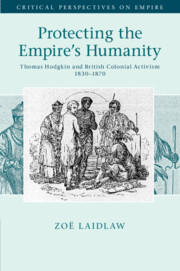Book contents
- Protecting the Empire’s Humanity
- Critical Perspectives on Empire
- Protecting the Empire’s Humanity
- Copyright page
- Dedication
- Contents
- Figures
- Maps
- Acknowledgements
- Abbreviations
- 1 Introduction
- Part I Mapping Humanitarianism
- Part II Humanitarianism and Settler Colonialism
- 6 Making Colonization Civilizing
- 7 Dealing with the Devil
- 8 Conscripts of Civilization
- 9 Betrayal in the Borderlands
- 10 Conclusion
- Bibliography
- Index
7 - Dealing with the Devil
Systematic Colonization in Australasia
from Part II - Humanitarianism and Settler Colonialism
Published online by Cambridge University Press: 14 September 2021
- Protecting the Empire’s Humanity
- Critical Perspectives on Empire
- Protecting the Empire’s Humanity
- Copyright page
- Dedication
- Contents
- Figures
- Maps
- Acknowledgements
- Abbreviations
- 1 Introduction
- Part I Mapping Humanitarianism
- Part II Humanitarianism and Settler Colonialism
- 6 Making Colonization Civilizing
- 7 Dealing with the Devil
- 8 Conscripts of Civilization
- 9 Betrayal in the Borderlands
- 10 Conclusion
- Bibliography
- Index
Summary
Despite the boost it gave to settler colonialism, Thomas Hodgkin and the Aborigines’ Protection Society initially supported colonization on the ‘systematic’ principles advocated by Edward Gibbon Wakefield. This chapter examines the society’s engagement with three systematic colonization schemes: South Australia; ‘Australind’ in Western Australia; and New Zealand. The systematic colonizers recognized the strength of contemporary humanitarian sentiment: they couched their plans in philanthropic language and courted the support of the Aborigines’ Protection Society. However, evidence quickly emerged of the systematic colonizers’ indifference to and violation of indigenous rights, yet the Aborigines’ Protection Society continued to advocate new systematic colonization schemes into the 1840s. This chapter explores humanitarian dissatisfaction with existing vectors of indigenous protection; desperation for a solution to the emigration crisis; growing disillusionment with imperial inquiries and imperial authorities; the charismatic force exerted by Wakefield; and the allure of a ‘systematic’ plan to protect indigenous rights.
Keywords
- Type
- Chapter
- Information
- Protecting the Empire's HumanityThomas Hodgkin and British Colonial Activism 1830–1870, pp. 206 - 237Publisher: Cambridge University PressPrint publication year: 2021

